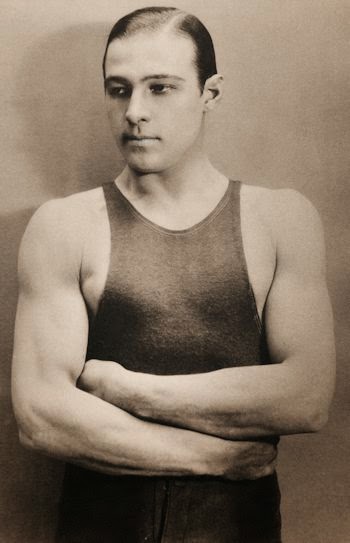The Son of the Sheik Music and Tints - The Rudolph Valentino Blogathon
Valentino's final film The Son of the Sheik is 90 years old in 2016. So much has been written about the film and his passing as soon as the film was going into general release, I thought it might be fun to approach the film and see it through they eyes of a visitor to the theater in 1926.
The first thing you'd see, naturally, would be a line of people outside the theater and the movie posters beckoning you to enter.
 |
| 1926 first release poster |
Since the film did not go into general release until after Valentino passed away in August, United Artists took a risk in releasing the film. Releasing the film after his death would have been viewed as morbid, or lacking in taste. United Artists was in a quandary. The fans, however, made it plain that they wanted to see Valentino and the film was a massive success.
During the silent era, many of the "big" or "prestige" films had a full score composed for the film, films such as Monsieur Beaucaire or Orphans of the Storm had a complete score. Most films did have music, it came in the form of a "cue sheet." This left the musicians, or often, the house organist, plenty if wiggle room to noodle their way through the film. Make no mistake, the artists who played for the films had a huge arsenal of music not only at their fingertips, but, in their heads.
The Son of the Sheik came with a cue sheet.
 |
| The first page of the musical cues |
 |
| Title Card tinted orange/sepia |
The processed film prints rented to the theater owners often were tinted. The cue sheets not only had hints for the musical cues by the titles, but, also by the color of the scene.
 |
| The cues for the start of the film |
 |
| Night scenes were tinted purple |
 |
| Daytime were a cool blue |
 |
| Valentino crushes rose |
| The matching musical and tinting cue |
The next scenes in the tent went from dark blue
to red, depending on the action, and mood.
The tinting, toning and the musical selections greatly heighten the experience in watching this film, and, in fact, any silent film. Sadly, as far as I know, no original release 1926 print of the film is extant. All prints derive from the 1938 reissue that had an added musical track and sound effects. Most prints show a fair amount of grain and scratching. It is a real pity that a first generation print, or camera negative, do not exist. The Son of the Sheik is a beautifully shot film, the cameraman was the legendary George Barnes. Barnes started in the early teens and later won his sole Academy Award for Alfred Hitchcock's 1940 film Rebecca.
The Son of the Sheik was directed in stylish and tongue and cheek fashion by George Fitzmaurice.
Valentino had originally hoped his 1922 film Blood and Sand would have been directed by Fitzmaurice, but it was not to be. During filming, they became fast friends.
 |
| Fitzmaurice schools Valentino in the art of seduction |
Happily for Valentino fans, and silent film fans, The Son of the Sheik still exists and is readily available on DVD. If Valentino's cinematic legacy suffered same fate as so many of his contemporaries, their total output lost to time, except this one film his reputation as a screen actor and magnetic personality would be there for future generations to witness.
The Rudolph Valentino blogathon is hosted by Michelle at Timeless Hollywood. I'm very happy to have been invited to participate and am anxious to read the contributions.






Comments
Don't forget to read my contribution to the blogathon! :)
Cheers!
Le
http://www.criticaretro.blogspot.com
It's been a few years since I saw the film last but its a striking movie. Such a shame to lose him so early, though its doubtful he was have transitioned into the sound era successfuly. I have some costume sketches that Adrian designed for him for this film - real trasures.